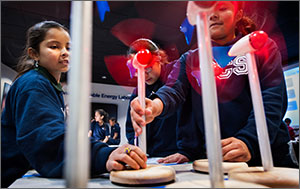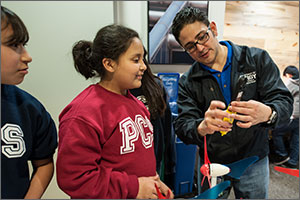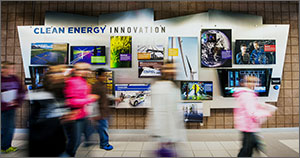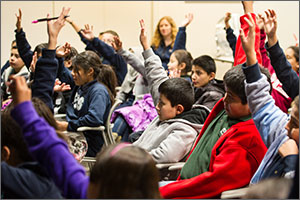NREL Energizes Outreach at Education Center
 Enlarge image
Enlarge image
Fifth- and sixth-grade science students from Pioneer Charter School work on a wind
turbine experiment during a field trip to NREL's Education Center to learn about renewable
energy.
Photo by Dennis Schroeder
Are you a student considering future opportunities in science and engineering—or a teacher seeking new and interesting ways to supplement the energy education in your science classroom? Perhaps you are a community organization looking to learn more about how emerging energy technologies can be beneficial on a local or global scale—or a small business or property owner wanting to better understand how these technologies might be applied to benefit your building or business in a very direct way?
If you fit into any of these categories—or if you have any other interest in renewable energy and energy efficiency technology—the Energy Department's National Renewable Energy Laboratory (NREL) is ready to help.
Guided by the belief that preparing future generations of scientists and engineers, along with nurturing an informed public to make empowered energy choices, are critical objectives as we move toward a clean energy future, NREL has upgraded its public education and outreach capabilities through an extensive rebranding and reprogramming effort at its Education Center.
Located just outside the main gate of NREL's sustainable campus in Golden, Colorado, the Education Center has repositioned itself using targeted programming to best serve the shifting needs around energy education for students and consumers alike.
"Our goal was to make NREL and our R&D innovations more accessible to the public and to create an experience that is appealing to a broad range of audiences," said NREL Community Affairs Manager Janice Rooney, who led the effort on the Education Center rebranding. "We're creating a more in-depth experience for visitors with the goal of encouraging students to be impassioned toward future study in science and technology disciplines, while at the same time providing the general public with the knowledge that they need to better apply these technologies in their homes and communities."
Educating the Scientists and Engineers of Tomorrow
 Enlarge image
Enlarge image
NREL Education Specialist Marcus Giron helps Pioneer Charter School students with
a wind turbine experiment during a field trip to NREL's Education Center.
Photo by Dennis Schroeder
Engaging students in renewable energy and energy efficiency topics opens doors for study and career opportunities in science, technology, engineering, and mathematics (STEM) disciplines. These backgrounds are critical in advancing workforce development objectives to assure that NREL and the nation have the sustained pipeline of highly trained STEM workers necessary to get us to a clean and sustainable energy future.
Energy education in schools is evolving rapidly. NREL, with its topical expertise and its revamped student programs at the Education Center, is in a unique position to supplement these efforts and provide a valuable experience for both students and educators.
Programs are aligned to Colorado's core academic science standards in an effort to complement and support what is happening in local science classrooms. The result is new programming that brings a structured and focused approach to energy education and is calibrated to educators' needs.
"We've made a significant effort to understand what teachers want and need from us when they visit, and we've incorporated that into our programs," said NREL Education Programs Specialist Marcus Giron, who developed the new school programs at the Education Center. "We've developed content and activities that are customized to the age and experience of the classes, and we've made the programs much more hands-on and interactive in an effort to make learning about energy more fun and interesting for the students."
Starting with 'Watts Up with Electricity,' a program for fourth- and fifth-graders that covers more basic concepts around electricity and includes hands-on activities with hand-crank generators as well as solar and wind power experiments, the programs advance to meet the needs of older students, exploring more complex renewable energy and energy efficiency concepts for middle-school students as well as the global impact of technologies and career opportunities for high-school classes.
Since October, the Education Center has hosted more than 30 classes and provided energy education opportunities to more than 1,100 students. The updated programs have been a hit with both the students and their teachers, many of whom will be returning year after year with their classes.
"We're currently studying energy resources in our classroom, and I thought it would be beneficial for my students to hear directly from the experts at NREL," said Pioneer Charter School Science Teacher Andrea Seymour. "This field trip was very beneficial for my students. The highlight was the opportunity for them to be actively engaged collecting data in hands-on activities."
Energy Education Isn't Just for Kids
 Enlarge image
Enlarge image
Children taking part in an educational field trip walk past an interactive display
at NREL's Education Center.
Photo by Dennis Schroeder
In addition to offering exciting new opportunities for students, NREL's Education Center continues to serve the needs of adult groups and the general public through a broad range of activities. Expanded offerings include a variety of programs designed to address renewable energy and energy efficiency innovations for both technical and non-technical interest, which introduce NREL and its work to a wide array of audiences and provide the public with opportunities for personalized interaction utilizing the Education Center's experienced team of volunteers.
"We now have a variety of avenues for people to access NREL and our expertise," Rooney said. "People can come here, either as part of a group or on their own, and learn about NREL, how we provide value, and how they can benefit from renewable energy and energy efficiency technologies. We're reaching more people this way."
One highlight is an ongoing 'Power Lunch' lecture series. Topics vary and appeal to both technically minded people looking for a deeper insight into NREL's research as well as concerned consumers seeking ways to implement renewable energy and energy efficiency technologies into their homes and communities. During the summer months, this programming is supplemented by an after-hours lecture series that focuses on consumer-oriented approaches to common energy topics in addition to providing an introduction to NREL and its research. Additionally, adult or youth community groups can make reservations in advance for on-demand group programs led by the Education Center's expert volunteer staff.
The community can also benefit from the new Education Center by taking advantage of the facility's updated exhibits and expert volunteers. Volunteers introduce each visitor to NREL, then provide direct, hands-on assistance to address topics of interest to the guest. A new walking tour for adults offers the public an up-close look at NREL's sustainable campus design.
"We are providing a facilitated introduction to NREL and renewable energy technologies to our visitors. This information is being delivered in an updated format to assure that we can always stay on top of current innovations for the public when they visit us," said NREL Public Affairs Specialist Sarah Barba, who manages the operations and programming at the Education Center. "We want to make sure that we are effectively communicating what NREL is doing, why it is important to them, and how these technologies are readily available to them and can improve their lives and their communities. This personalized and engaged approach is effective for getting these messages across in an impactful way."
Engaged Staff, Volunteers, and Exhibits Connect NREL to the Community
 Enlarge image
Enlarge image
Fifth- and sixth-grade science students from Pioneer Charter School raise their hands
to answer a question as they learn about renewable energy at NREL's Education Center.
Photo by Dennis Schroeder
The programming and information delivered at NREL's Education Center would not be possible without a dedicated team of experts with a passion for getting the word out about renewable energy and energy efficiency. That team takes shape in the form of volunteers, along with significant contributions from NREL research staff to support the development of interactive exhibits.
"In addition to revamping our facility and our programs, we've been rethinking how we use our volunteer resources to maximize their value to our content and to our visitors," said Barba. "We align our volunteer responsibilities to their skill sets and interest areas. This creates more interesting and interactive opportunities for them, and they seem to find the experience rewarding."
An exhibit called the 'NREL Energy Story' allows visitors to get a virtual tour of the NREL campus and better understand how the lab generates and use energy. Developed by NREL researchers, the exhibit is part of a larger energy use analysis of NREL's campus, which is designed to innovate and develop cleaner and more efficient ways of harnessing and using energy. This allows the NREL campus to serve as a proving ground for these technologies—and the exhibit demonstrates how the strategies and lessons learned could be applied successfully elsewhere.
"It shows what we are doing here on our campus," said Barba. "But what we're really demonstrating, and what is really important to visitors, is what they can do at home, what their communities can do, and what the world can do as a whole."
Another new exhibit allows visitors an opportunity to see what life is like inside one of NREL's research laboratories and get to know the research community a bit better. 'Meet the Scientist' takes visitors behind the scenes, via video, into three distinct and different research laboratory environments where they get a chance to learn more about the scientists and their work, with a focus on the researchers' backgrounds and passion for science. Hoping to inspire the next generation of scientists toward STEM studies and careers, the NREL researchers take this responsibility seriously and enthusiastically support these types of efforts.
"What I am most proud of is all of the young scientists I have mentored over the years who are now making an impact themselves," said NREL Research Fellow David Ginley of the 'Meet the Scientist'. "Don't lose sight of the fact that science is a lot of fun. It's a chance to explore the world, learn more about it, and then do things differently and create things that are completely new that can make a difference in the lives of people all over the world."
A Model for Energy-Efficient Design
In addition to housing innovative new programs and exhibits to share the NREL story and information about renewable energy and energy efficiency, the Education Center building itself utilizes a variety of energy efficiency strategies that demonstrate the application of these technologies.
A 'Trombe Wall' is the building's most striking feature. The wall lights and heats a large portion of the facility using passive solar and daylighting technologies. A special insulation system improves the building's energy performance. A direct evaporative cooling system provides most of the cooling needs for the building in the summer. A computerized energy management system monitors conditions and occupancy to determine the most efficient methods for meeting the energy needs of the building and also monitors the building's performance for future refinements.
These building features, along with the sustainable features of NREL's campus, serve as a testimonial to what is possible with renewable energy and energy efficiency technologies. This, combined with the new programming and exhibits that have been implemented inside the building to make education and information accessible to all audiences, truly makes the NREL Education Center a showcase for the public understanding of NREL's research and the application of clean energy technology in communities large and small.
"I'm really proud of what we've done at the Education Center," said Rooney. "We are showing off a broad range of innovations and technologies along with dramatically improving how we explain NREL's work and how these technologies can benefit our future. We've made a meaningful upgrade in the program offerings available for educators by aligning our efforts with NREL's education and outreach mission. The Center's transformation is a big win for everyone here at NREL, as well as for the public, who rely on us as an invaluable resource."
— David Glickson
